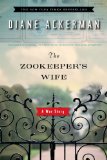Summary | Excerpt | Reading Guide | Reviews | Beyond the Book | Readalikes | Genres & Themes | Author Bio

A War Story
by Diane AckermanChapter 8
Lutz Heck took over the Berlin Zoo from his distinguished father in 1931, and
almost immediately began remodeling the zoo’s ecology and ideology. To coincide
with the 1936 Olympics, held in Berlin, he opened a "German Zoo," an exhibit
honoring the country’s wildlife, complete with "Wolf Rock" at its center,
surrounded by enclosures for bears, lynxes, otters, and other native species.
This bold patriotic display underscoring the importance of familiar animals, and
that one needn’t go to the ends of the earth to find exotic species, conveyed a
laudable message, and if he’d unveiled his exhibit today, his motives wouldn’t
be questioned. But given the era, his beliefs, and the ultranationalism of his
family, he clearly wanted to please Nazi friends by contributing to the ideal of
Germany’s master races. A 1936 photograph shows Heck and Göring on a hunting
trip to Schorfheide, Heck’s large preserve in Prussia; and the following year,
Heck joined the Nazi Party.
A big-game hunter, Heck spent the peak moments of his life pursuing danger and
adventure, several times a year launching trips to garner animals for his zoo
and perhaps bag a pair of longhorn sheep heads for his wall or come face to face
with a toweringly mad female grizzly. He relished wild razoredged hunts, in
Africa especially, which he recapped in scenic letters, written by lantern
light, astride a camp stool near a well-fed fire, while lions grunted invisibly
in the blackness and his companions slept. "The campfire flickering in front of
me," he once wrote, "and behind me coming out of the dark infinity the sounds of
an invisible and mysterious wild animal." Alone yet faintly haunted by circling
predators, he would replay the day’s exploits in ink, some to save, some to
share with friends in another drape of reality, the Europe that seemed to him
planets away. Action photographs often accompanied his letters: lassoing a
giraffe, leading a baby rhinoceros, capturing an aardvark, evading a charging
elephant.
Heck loved collecting trophies, as memory aids to a wild part of his self that
emerged in remote wilderness—live animals to display at his zoo, dead animals to
stuff, photographs to share and frame. In the heyday of his travels he seemed to
collect life itself, keeping voluminous diaries, snapping hundreds of
photographs, and writing popular books (such as Animals—My Adventure) which
limned his passion for the wilderness, in which he detailed feats of
extraordinary bravery, stoicism, and skill. Heck knew his strengths, admired the
heroic in himself and others, and could tell a bar-gripping story over drinks at
annual meetings. Though he indulged in self-mythology from time to time, his
personality fit a profession which has always attracted some people with a yen
for exploration, in flight from domesticity, and craving just enough ordeal to
feel the threads of mortality fraying. Without his type, maps would still show a
flat earth and no one would believe the source of the Nile. Sometimes Heck
slayed dragons—or rather their real-life equivalents—but mainly he captured,
photographed, and displayed them with gusto. Passionate and single-minded, when
he set his sights on an animal, either in the wild or belonging to someone, he
lusted after it, tried every lure or ruse he could think of, and persisted until
he exhausted the animal or wore down its owner.
For decades the Heck brothers had pursued a fantastic goal, a quest that engaged
Heinz but completely infatuated Lutz: the resurrection of three pure-blooded,
extinct species—the Neolithic horses known as forest tarpans, aurochsen (the
wild cow progenitor of all European cattle breeds), and the European or "forest"
bison. On the eve of the war the Hecks had produced some near aurochsen and
tarpans of their own, but the Polish strains ran truer to type, the clear
inheritors.
Reprinted from The Zookeeper's Wife by Diane Ackerman. Copyright (c) 2007 by Diane Ackerman. With permission of the publisher, W.W. Norton & Company, Inc.




Tread softly because you tread on my dreams.
Click Here to find out who said this, as well as discovering other famous literary quotes!
Your guide toexceptional books
BookBrowse seeks out and recommends the best in contemporary fiction and nonfiction—books that not only engage and entertain but also deepen our understanding of ourselves and the world around us.